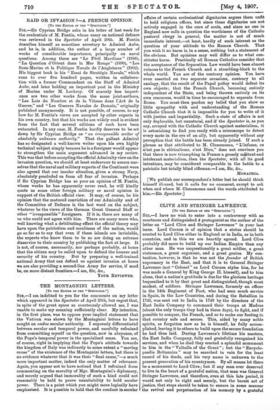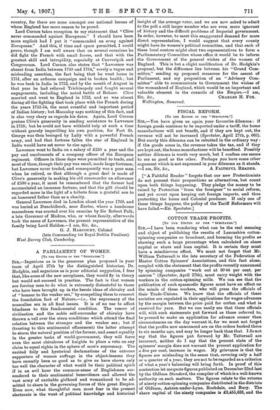OLIVE AND STRINGER LAWRENCE.
[To THE EDITOR OP THE "SPECTATOR."] SAE,—I have no wish to enter into a controversy with so courteous and distinguished Et protagonist as the author of the letter on "Lord Clive and Stringer Lawrence" in your last issue. Lord Curzon is of opinion that a statue should be erected to Lord Clive either in England or in India, or in both countries, and in this we are heartily agreed. Lord Clive probably did more to build up our Indian Empire than any other man. He was unquestionably a great soldier, a great statesman, a great organiser, and a great genius. My con- tention, however, is that he was not the founder of British supremacy in the East, and that it is to General Stringer Lawrence (not " Colonel" as Lord Curzon styles him, for he was made a General by King George II. himself), and to him alone, that a nation's gratitude is due for the glorious heritage bequeathed to it by that great and distinguished, though most modest, of soldiers. Stringer Lawrence, formerly an officer in the 14th Regiment of Foot, who had seen much service in Spain, in the Low Countries, and during the Rebellion in 1745, was sent out to India in 1748 by the directors of the East India Company to command their troops at Madras (about the only troops they had in those days), to fight, and if possible to conquer, the French, and so to make our footing in that country safe and secure. This, aided by many noble spirits, as forgotten now as he is himself, he fully accom- plished, leaving it to others to build upon the secure foundation he had thus laid. During Lawrence's lifetime his masters, the East India Company, fully and gratefully recognised his services, and when he died they erected a splendid monument to him in the " Valhalla of the Great"; but the " Encyclo- paedia Britannica " may be searched in vain for the least record of his deeds, and his very name is unknown to the present generation of his countrymen. By all means let there be a monument to Lord Clive ; but if any man ever deserved to live in the heart of a grateful nation, that man was General Stringer Lawrence, and therefore, even at this late period, it would not only be right and seemly, but the barest act of justice, that steps should be taken to ensure in some manner the revival and perpetiation of his memory by a grateful
country, for there are none amongst our national heroes of whom England has more reason to be proud.
Lord Curzon takes exception to my statement that "Clive never commanded against Europeans." I should have been more explicit bad I put it "commanded an army against' Europeans." And this, if time and space permitted, I could -prove, though I am well aware that on several occasions he did fight the French with small forces, and that with the greatest skill and intrepidity, especially at Cauveripak and Congeveram. Lord Curzon also states that "Lawrence was absent from India between 1749 and 1754," surely a vague and misleading assertion, the fact being that he went home in 1751, after an arduous campaign and in broken health ; but he was back in India in 1752, and by the month of August in that year he had relieved Trichinopoly and fought several engagements, including the noted battle of Bahoor. Clive married and went to England in 1752, and so was absent during all the fighting that took place with the French during the years 1752-54, the most eventful and important period of Indian history ; but Macaulay says nothing of this fact, and is also very chary as regards his dates. Again, Lord Curzon praises Clive's generosity in sending assistance to Lawrence in 1758; but he could not have withheld help at such a time without gravely imperilling his own position, for Fort St. George was then besieged by Lally with a powerful French army, and had that fortress fallen the star of England in India would have set never to rise again.
Lawrence went to India on a salary of £250 a year and the pay and emoluments of a company officer of the European regiments Officers in those days were permitted to trade, and moat of them, though their pay was small, made large fortunes; but Lawrence never traded, and consequently was a poor man when he retired, so that although .a great deal is made of Clive's generosity in making his old commander an allowance of 2500 a year, it must be remembered that the former bad accumulated an immense fortune, and that the gift should be regarded more in the light of a tribute from a grateful son to an honoured father than as a charity.
General Lawrence died in London about the year 1769, and was buried at Dunchideock, near Exeter, where a handsome mausoleum was erected over his remains by Sir Robert Palk, a late Governor of Madras, who, or whose family, afterwards took the name of Lawrence, the present representative of the family being Lord Haldon.—I am, Sir, &c.,
G. J. HARCOURT, Colonel
(late Commanding 1st Royal Dublin Fusiliers). West Surrey Club, Camberley.















































 Previous page
Previous page